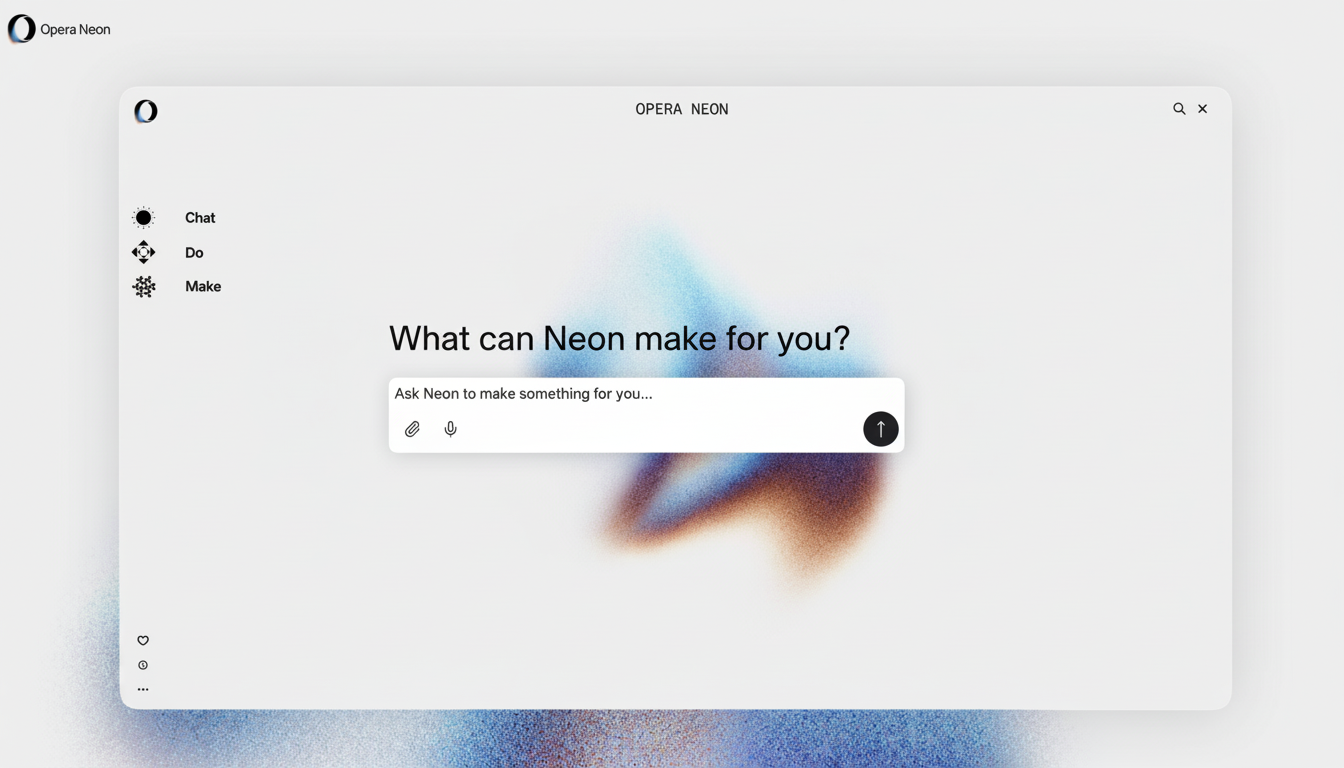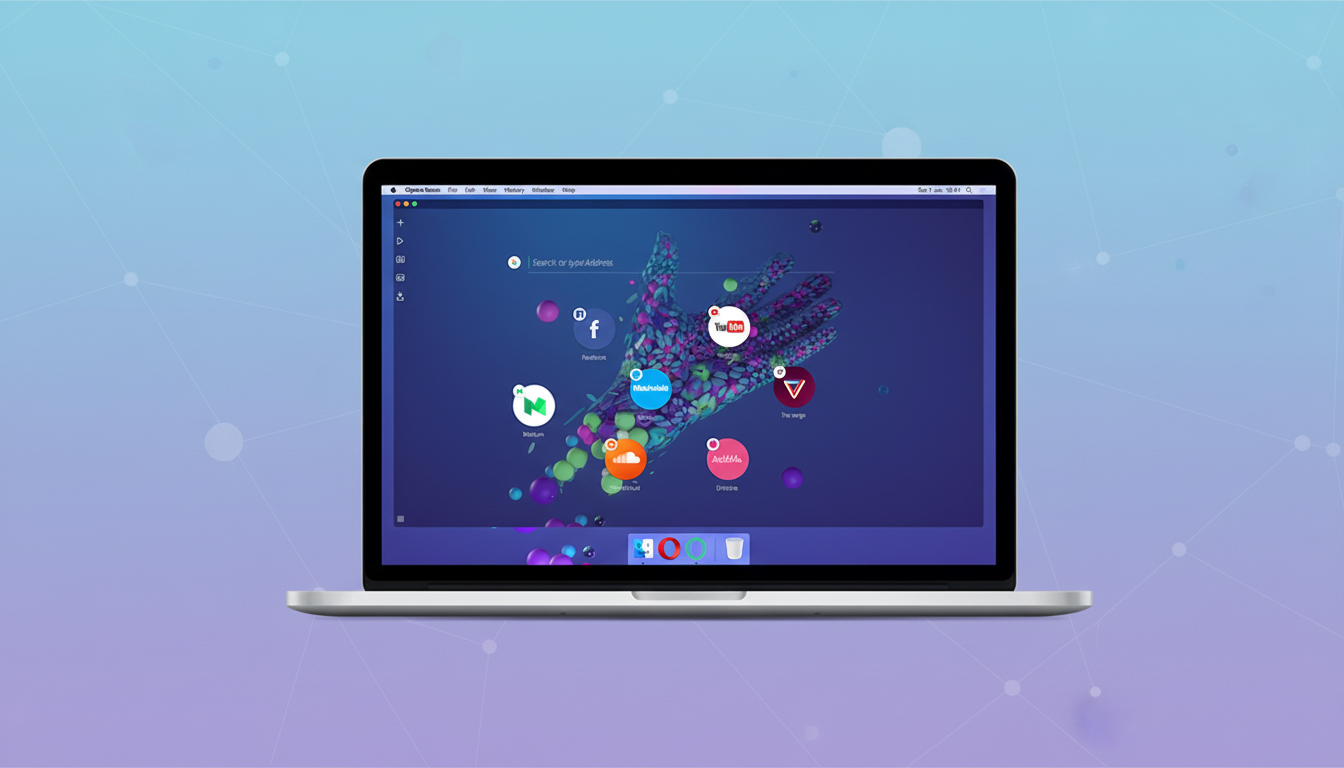Opera’s invite-only Neon browser arrives with a promising, if not fully polished, AI toolkit and good day-to-day performance, but this elegant experiment is not quite ready for mainstream use. Its $20-a-month price tag also feels high for the features that are well-done.
Having conducted their own hands-on testing, the decision is clear: “Neon mostly works as advertised but the value proposition just doesn’t add up.”

What Neon Gets Right in Everyday Browsing and AI Use
Neon is built on the familiar and fast. It’s based on the Chromium open-source project, so it shares much of its development and rendering technology with Chrome (and Edge), which is great for compatibility, rendering and extension support. Switching from Chrome is a matter of minutes — history, bookmarks and most of your extensions all come along without much fuss. Chrome has remained at roughly a 65% share of the global desktop browser market, if you believe StatCounter, so the “feels-like-Chrome” threshold is a clever way to minimize friction.
The browser doubles down on helpful defaults. The built-in ad blocking and VPN make it so most people won’t even need to go add-on hunting. A social sidebar includes Discord, Messenger, Slack, TikTok and X to bring popular services one click away without clogging your tab strip.
It’s Neon’s AI layer where it hopes to differentiate itself. You receive a persistent AI for chat-style prompts with agentic abilities that can actively do things for you. There are two agent modes — one handles the live session in the browser, and a separate virtual agent that spins up a one-shot instance, giving the possibility to retry on failure. That duality is admirable in theory and sometimes useful in practice.
Neon’s most unique idea is the Card system. Cards are mini-capabilities you can flip on for the assistant — presets for tasks, such as itinerary planning or code scaffolding. In testing, a budget-travel Card managed requests such as “Spain, $1,000, two weeks” with some structure and practical suggestions. It’s a lightweight, modular approach along the lines of an extension marketplace for the assistant, and not really the browser itself.
The privacy posture is refreshingly clear. Opera says Neon stores prompts and responses only temporarily (usually up to a month), does not use them to train models, and eschews data-for-ads schemes. It aligns with what privacy advocates want — minimization, retention limitations, and no model training on user content — without burying users in toggles.
Where the Experience Misses a Step in Agent Reliability
Unfortunately, reliability is the Achilles’ heel of agents. A lot of complex, multi-step procedures get botched too frequently. A simple query to find a meatball recipe and add items to Instacart derailed after only a handful of products. A more complicated one — pulling Warframe relic data into a Google Sheets table — had issues interfacing with Sheets. Switching over to the virtual agent sometimes saved the task, but it took a while and left us with a link to a spreadsheet outside of Sheets instead of populating our live document.
And that brittleness isn’t unique to Neon; agentic workflows are brittle in general, whether we’re looking at browsers or bots. But it is more telling here where “agents that do the work” actually counts as a good reason to pay. When a browser-native alternative with as many stumbles, like Gemini’s integrated Sheets tool, can do the same job — a little faster and less painfully — there’s not much reason to pay the premium on browsing.

Model selection is another sore point. Neon taps the average from popular models from Google and OpenAI, and auto-routes based on your prompt. That’s fine for casual users, but power users are getting used to a picker — pick a model, get the speed or quality you’re willing to pay for and know exactly what hardware is under the hood. Perplexity and a handful of its top assistants already expose that control, which makes Neon sound more shut than it should be.
Extension support is a little bit of feast and famine. Compatibility with the Chrome Web Store is a win, but anything that’s unavailable or delisted will not install. Neon’s Cards are useful, but they don’t substitute for the depth and maturity of the broader extension ecosystem — especially for niche workflows.
Pricing Reality Check on Neon’s Subscription Value Today
Neon is $20 per month following an invite-only trial and there is a temporary price break for early testers. For a browser, that sits alongside flagship AI services. It’s also in line with the going rate for services like ChatGPT Plus and Perplexity’s premium tier — platforms that provide deep model access, features at the on-demand API level, and AI stack iteration speed.
Neon instead wants you to pay for the container over the content. The charge does not cover extras like model credits, premium storage or advanced automations. And when they misfire and no one forks the code, what you have is a decent Chromium browser — which users can get for free from several other providers.
Subscription fatigue is a real phenomenon, and industry surveys such as Deloitte’s Digital Media Trends have repeatedly identified increasing consumer skepticism about the value of recurring costs. In order for Neon to clear that bar, the AI has to deliver consistent results — save time, drive value and be better than a free alternative. Today, it doesn’t.
Who Should Try It Now, and What to Watch in Upcoming Updates
Neon is worth giving a shot, should you score yourself an invite — especially if you are already invested in Opera’s ecosystem and looking for an assistant that ties everything together with the promising Card framework. And the upcoming Opera Deep Research Agent, which aims to make multiple-source discovery possible inside a sidebar, might do something if it were fast, accurate and forthcoming about sources.
For most people, the best course is to wait. Features that would make it worth the price include a dependable, end-to-end agent experience; a good model picker with transparent cost and capabilities; tighter integrations into things like Sheets, Notion, Instacart; and guardrails that tell you exactly what the agent did and why.
Neon demonstrates that AI-first browsers can be stylish and user-friendly. But unless its agents perform more reliably and the subscription handily trounces free competitors, it’s a decent experiment but not an essential purchase.

